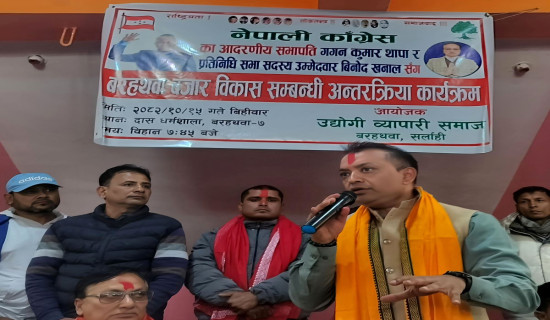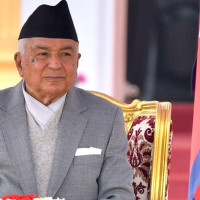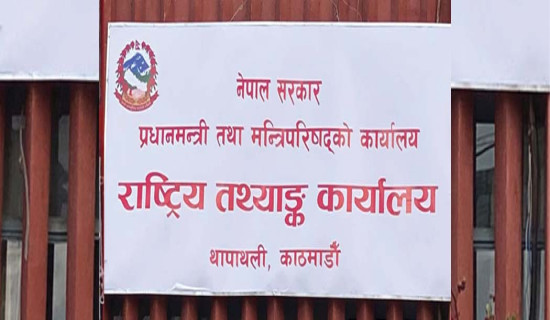- Friday, 30 January 2026
Setting up a fertiliser factory still a far cry
Kathmandu, May 18: Nepal, traditionally an agrarian country, lacks even a single fertiliser plant, and this culminates in the recurrent fertiliser shortage during every plantation season. Farmers across the country did not get fertiliser to plant maize recently, and fertiliser shortage is sure to make news headlines in a month when the paddy plantation season begins.
Despite repeated assurances from the government and years of discussions, Nepal has not yet made a concrete progress toward establishing a fertiliser factory. The plan to begin a process to set up a fertiliser factory in the country that every government has been including in its annual policy document for decades has been nothing more than tall talk.
For years, the government has floated the idea of building a fertiliser plant to reduce dependency on imports and address chronic shortages. The idea of establishing a domestic fertiliser plant in Nepal is not new. Since the 1980s, the government has floated proposals to this end.
However, no definitive blueprint or timeline has been finalised, said experts. As a result, farmers continue to face a serious shortage of fertilisers when they need them the most. These shortages impact crop productivity, food security and economic stability.
Agriculture experts and stakeholders argue that establishing a fertiliser plant in the country is a necessity.
Nepal currently relies heavily on imports, particularly from India, and any disruption in cross-border trade leads to serious supply issues.
Earlier, a task force formed under the leadership of the Finance Minister had prepared a report with the conclusion that it is appropriate to set up a fertilsier plant.
Accordingly, the government assigned the responsibility to the Investment Board Nepal to take forward the process of setting up a manure factory.
In this regard, the government, through the Office of Investment Board, intended to carry out a detailed feasibility study for a urea fertiliser plant.
40-year-old pipe dream
The government has prioritised the establishment of fertiliser factory in its policies, programmes, and budgets for the past few years and IBN carried out the feasibility study for the establishment of a plant, said Dr. Hari Bahadur K.C., joint secretary at the Ministry of Agriculture and Livestock Development.
The government has advanced the process and study to establish the factory at the earliest to ease the supply of chemical fertilisers in the country, added Dr. K.C.
The government has undertaken two major studies on the prospect of establishing a chemical fertiliser plant in Nepal. The first, a feasibility study conducted by Japan International Cooperation Agency (JICA) in 1984, with a focus on using water electrolysis technology to produce urea.
The second study was done in 2015 by the consortium of Infrastructure Development Corporation (Karnataka) Ltd., India, the Institution of Agricultural Technologists, and Shah Consult International Pvt. Ltd. (IDeck).
The latter study focused on using natural gas technology as a suitable option to produce urea in Nepal. It had compared three feedstock options – natural gas, coal, and water - using electrolysis for ammonia and urea synthesis. The factors used to determine suitability were technology, energy intensity, and production cost
However, no decision has been reached on the construction of the plant, and the government should quickly reach a conclusion, he said.
"If it is technically and economically feasible to build a urea production plant in the country, the construction should be taken forward immediately and if not, the government should prepare to arrange for a smooth supply of chemical fertilisers in the long term as per the demand and requirement, bringing discussions over this issue to an end," he told The Rising Nepal.
Study outlines USD 714 million factory
In the meantime, recently a new Detailed Feasibility Study Report (DFSR) regarding the establishment of urea fertiliser plant was done by the German-based DIAG Industries GmbH.
"We received the DFSR from the company. We will analyse the report with the experts in the sector. After analysing the report, the IBN will take forward and sign MoU with the company for further works in the establishment of the plant," Pradyumna Prasad Upadhyay, joint secretary and spokesperson at the IBN, said.
On July 13, 2023, IBN signed a Memorandum of Understanding (MoU) with German-based DIAG Industries GmbH for the preparation of Detailed Feasibility Study Report (DFSR) for the establishment of a chemical fertiliser plant (urea) in Nepal.
He said the company has proposed three options for installing the plant: natural gas, electricity, and a combination of both.
The government would forward a process of establishing the plant with the best alternative after analysing the report from experts, he added.
According to the IBN, the DIAG Industries GmbH has proposed the establishment of the plant in BOOT model with an estimated cost of USD 714 million in 150 bighas of land in Bardaghat, Nawalparasi.
The report proposed establishment of the plant in public-private partnership where foreign investment will be 70 per cent and domestic 30 per cent.
The capacity of the plant will be 700,000 tonnes of urea fertiliser yearly. It has proposed to complete the construction in three years after the construction process begins.
“We are not only building a factory but also laying the foundation for long-term agricultural sustainability,” said K.C. “This project will benefit millions of smallholder farmers who are the backbone of our economy.”
He expressed his hope that the government would advance the construction process of the plant at the earliest by analysing the latest report received from the German-based DIAG Industries GmbH.
Koshi government to establish fertiliser plant
Not only the federal government, but also the Koshi Provincial Government has taken an initiative to open a urea fertiliser factory based on green hydrogen and carbon capture technology.
During the two-day investment summit organised by the Koshi Provincial Government from May 2, a Memorandum of Understanding (MoU) was signed between the Koshi Provincial Investment Authority and Nepal Green Hydrogen Company Private Limited.
The two bodies reached an agreement for the detailed feasibility study (DPR) required to construct a urea fertiliser factory in Sunsari and Udayapur districts, which are considered suitable for establishing and operating a chemical fertiliser factory.
Dr. Prem Prasad Dangal, former chairperson of the National Farmers' Commission, stressed the need to implement the government's decision to set up a urea fertiliser factory as soon as possible.
"To reduce dependency on imported fertilisers and save huge amounts of money, there is no alternative to setting up a fertiliser factory within the country," he said.
Recurring scarcity of fertilisers
With agriculture employing over 62 per cent of the population and contributing nearly 24 per cent to Gross Domestic Products (GDP), the need for a stable and self-sufficient fertiliser supply has become urgent, said Dr. Dangal.
Nepal requires at least 800,000 tonnes of chemical fertiliser, including urea, DAP and potash annually, but supplies often fall short, rarely exceeding 500,000 tonnes. As a result, farmers face severe shortage during each planting season.
Based on the current supply of chemical fertilisers and farmers' use, there won’t be crisis of fertilisers with the supply of about 500,000 tonnes of fertilisers, said K.C.
According to him, Nepal needs 65 per cent urea, 30 per cent DAP and 5 per cent potash of the total amount a year.
For the past two to three years, the government has been importing and supplying about 400,000 tonnes of fertiliser, which has somewhat addressed the acute shortage of fertiliser.
The government has been importing and distributing chemical fertilisers through the public agencies - Agricultural Inputs Company Limited (AICL) and Salt Trading Corporation (STC).
The government has allocated a budget of Rs. 27.95 billion for chemical fertilisers as subsidies in the current fiscal year and has set a target of importing about 550,000 tonnes of fertiliser with that money.
The budget allocated as subsidy for chemical fertilisers is only 65 per cent of the total cost of fertiliser import. Although the government has allocated sufficient budget for subsidies for chemical fertiliser imports, fertiliser imports have not been adequate due to various external factors, including global tensions and production conditions, Dr. K.C. added.
Nepal has spent approximately Rs. 87.35 billion on subsidies in the last five years since 2019/20.
Famers of some parts of the country are still facing the problems of chemical fertilisers in this season, said Dr. Dangal.
Over Rs. 40 billion spent yearly on chemical fertiliser import
Approximately over Rs. 40 billion is spent annually on chemical fertilisers.
Even after spending such a huge amount to import and distribute fertilisers, it is not enough for farmers and they face a shortage of fertilisers every year during the time of plantation, conceded joint secretary K.C.
It is estimated that if the country imports 800,000 tonnes of chemical fertilisers, the annual expenditure on fertilisers at current prices will be more than Rs. 80 billion.
K.C. said that about 55 per cent of the total budget of the Ministry of Agriculture and Livestock Development is spent on chemical fertilisers.
Therefore, the ministry cannot spend more on infrastructure development and other activities to increase productivity and production of agricultural goods.
Dr. Dangal said that the factory could be established with the three-four-year budget allocated by the government for subsidies on chemical fertilisers
















